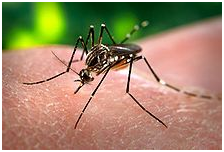
“There’s a pandemic in progress.”-- Dr. Anthony Fauci, director of The National Institute of Allergy and Infectious Diseases at the National Institute of Health
East County News Service
January 15, 2016 (San Diego) – Zika virus has spread to at least 14 countries in the Western hemisphere as well as Puerto Rico. Tests have linked Zika virus to babies born with microcephaly, a birth defect that causes babies to be born with small skulls, brain damage and sometimes death.
Today, the U.S. Centers for Disease Control and Prevention issued a travel warning urging pregnant women and women who may become pregnant to postpone travel to Brazil, Colombia, El Salvador, French Guiana, Guatemala, Haiti, Honduras, Martinique, Mexico, Panama, Paraguay, Puerto Rico, Suriname, and Venezuela.
Zika is spread by mosquitos biting an infected person and then biting another, transmitting the virus. The worst outbreak is in Brazil, where 3,530 cases of microcephaly in infants have been confirmed—a 20-fold increase over 2014, when there were only 147 cases of the neurological condition.
Women who are pregnant or who may become pregnant should talk to their doctors if they must travel and take steps to prevent mosquito bites.
All travelers to these areas should use insect repellant containing DEET, picaridin, oil of lemon eucalyptus, or IR3535. The CDC has indicated these are safe for pregnant and nursing women. You should also wear lightweight long-sleeves and long pants and consider wearing permethrin-treated clothing and gear. Be sure your sleeping area is screened to keep out mosquitoes or has air conditioning.
There is no vaccine or treatment for the Zika virus infection, which is spread by Aedes mosquitoes. Two species of Aedes mosquitoes have recently been found in San Diego County but thus far the Zika disease has not been found here ,
In the United case, several cases have been diagnosed in Puerto Rico among individuals bitten by mosquitoes who had not traveled. At least eight cases in the last two years have been diagnosed in travelers returning to the U.S.
The mosquito season peaks in April, so many more cases are likely to occur across the Southern hemisphere and other infested areas, health officials warn. Aedes mosquitoes can also carry deadlyYellow Fever, chikingunya, and dengue fever.
In Mexico, there has been one imported case from Colombia, one case contracted by a mosquito bite in Chiapas and one in the northern State of Nuevo Leon, but authorities fear more cases will be identified .
The disease is primarily spread by mosquitoes, though there is some evidence that it may also be transmitted sexually. The CDC advises that it is possible that Zika could be spread through blood transfusion, though there are no documented cases of this.
"That's a pandemic in progress," Dr. Anthony Fauci, director of The National Institute of Allergy and Infectious Diseases at the National Institute of Health recently said, CNN reports.
Researchers are racing to create a Zika Virus vaccine and improved treatments. But for now, avoiding areas with Zika outbreaks or taking steps to avoid being bitten by mosquitos if you must travel to infested areas are the only options.
In San Diego County, health officials urge residents to get rid of standing water, since the Aedes mosquito can breed in just a thimbleful of water. Clean rain gutters and dump out water from planters, toys, vehicle tarps, old tires and elsewhere. Clean out bird baths weekly, keep water circulating in ponds and fountains and don’t let pool water turn green, since mosquitoes breed in stagnant water.
The Aedes mosquito is aggressive during daylight hours, unlike native mosquitoes in our region. It can also breed indoors. If you believe you may have Aedes mosquitos in your area, contact the County Vector Control office. You can also get more info on how to prevent mosquito breeding here: http://www.sandiegocounty.gov/deh/pests/wnv/general_information/chd_wnv_mosquito.html
Only about one in five people who contract the Zika virus will develop symptoms. Symptoms may include fever, muscle and joint pain, rash and conjunctivitis (eye inflammation). Rarely, complications may include Guillain-Barre syndrome,
Here is information for healthcare providers on Zika virus: http://www.cdc.gov/zika/hc-providers/clinicalevaluation.html and http://www.cdc.gov/zika/hc-providers/diagnostic.html










Recent comments